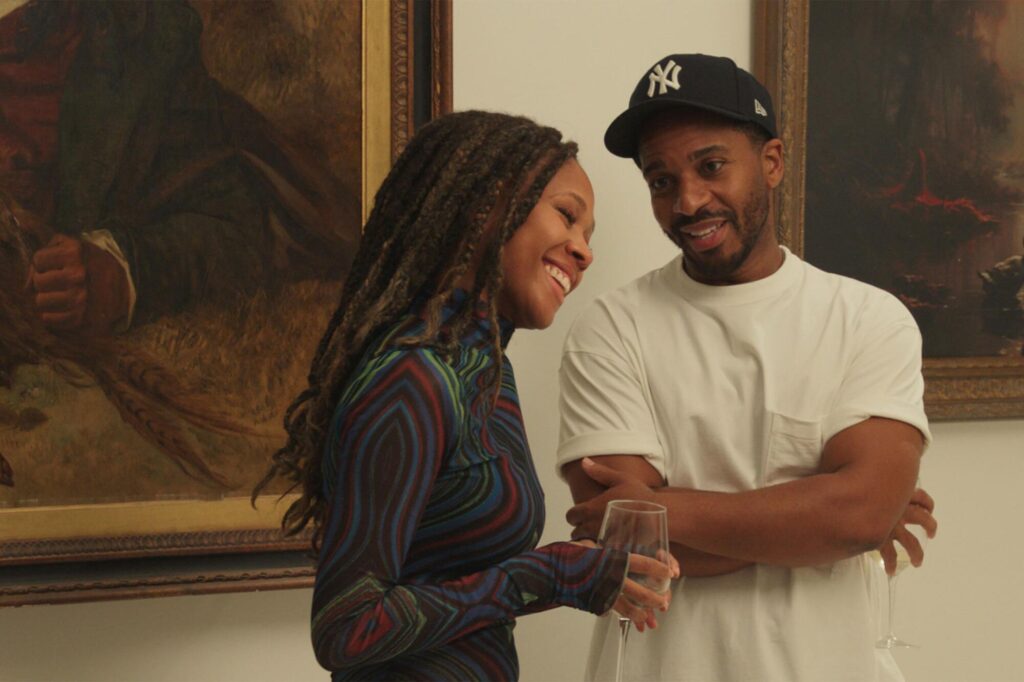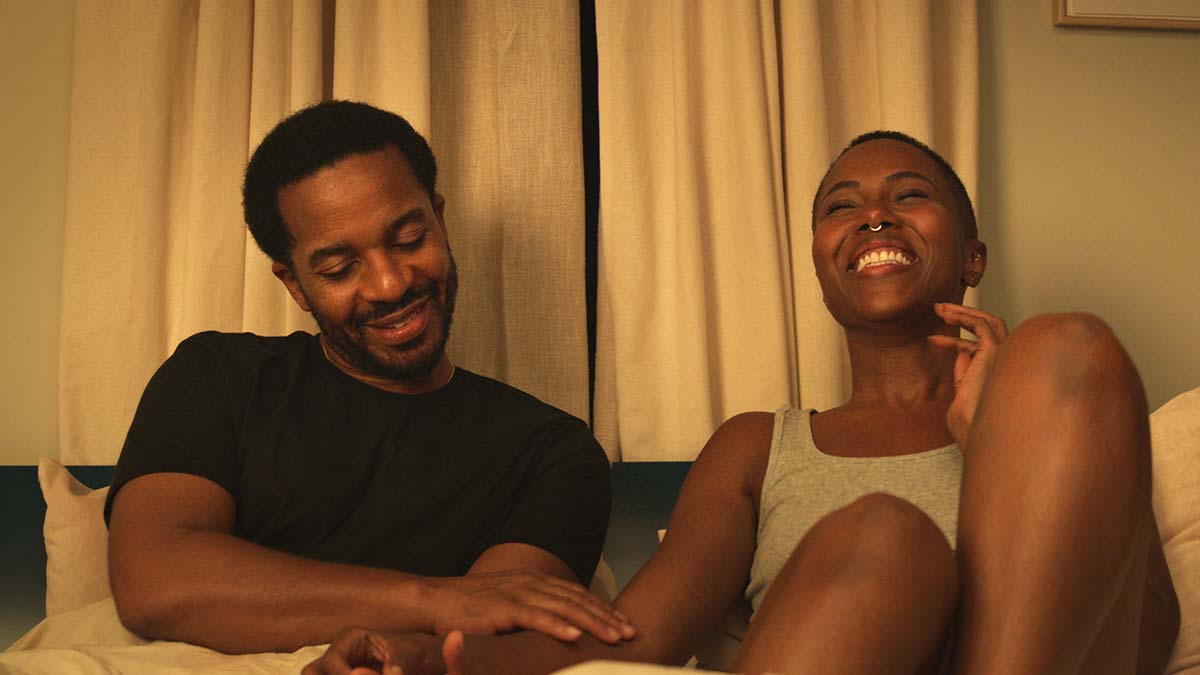Brooklyn has always been a place where contradictions comfortably coexist — a neighborhood where the past and present meet at every corner, and where cultures don’t just clash but mix in deeply flavorful, soulful ways. That’s the backdrop for Love, Brooklyn, a romantic dramedy that explores not only the shifting landscape of one of New York City’s most iconic boroughs but the inner lives of people trying to make sense of love, identity, and belonging in their late 30s. For Nicole Beharie, who stars in the film and returns to her old stomping grounds of Bed-Stuy and Clinton Hill during production, the experience was like slipping into a familiar, beloved rhythm.
She likens Brooklyn to Disneyland — not in its fantasy, but in its sensory overload and multicultural mosaic. “You know the ‘It’s a Small World’ ride, where you go through all the different countries?” she says. “That’s New York.” It’s a place where a Michelin-star restaurant might sit beside a jerk chicken joint or a Korean barbecue spot, and the Orthodox Jewish community walks through it all like a reminder that everyone belongs, even if the city itself is constantly changing. “I’m obsessed with it,” she says, and you can tell it’s not just nostalgia. It’s love.
Love, Brooklyn tells the story of Roger, a journalist played by André Holland, who’s assigned to write about the gentrification of his neighborhood. But the assignment quickly becomes personal. Roger is navigating a complicated love triangle with his ex-girlfriend Casey, played by Beharie, an art gallery owner and his longtime best friend, and his new partner Nicole, portrayed by DeWanda Wise, a widow whose young daughter has grown attached to him. The film is a quiet, tender exploration of what it means to grow up emotionally — to reconcile the version of yourself that once dreamed with the version of yourself that now has responsibilities, relationships, and roots.
Beharie says the story is told in a way that reflects real life. It doesn’t feel forced, dramatic, or overly stylized. “It’s handled in a way that doesn’t feel too dark or heavy. It feels kind of like what life is,” she says. That gray area — the not-quite-this, not-quite-that space — is where Love, Brooklyn lives. The relationship between Roger and Casey, in particular, is messy in that very specific way that long histories make things complicated. “Are they a thing? Are they best friends? Like, what is happening with them?” she says, laughing. It’s a question many people in their 30s and 40s will recognize, especially in tight-knit communities where people don’t always grow apart — they grow alongside one another in strange, sometimes unspoken ways.
The film’s director, Rachael Abigail Holder, knew exactly what kind of presence the role of Casey needed. When she read the script by Paul Zimmerman, she saw in Casey a Black woman who was whimsical, sharp, and free-spirited — traits not often given space in modern cinema. “Nicole, a brilliant actor who hasn’t had many opportunities to be funny and light on her feet, was a perfect match,” Holder said. There’s a quiet precision to Beharie’s performances, a depth that doesn’t scream for attention but instead pulls you closer. “She finds the humanity in silence, the spaces between the words, and that subtle, quiet power was vital for the role.”
That emotional fluency may stem from a life lived in many worlds. Beharie, now 40, was born in West Palm Beach, Florida, but her childhood was shaped by a global patchwork of experiences. Her father worked in the United States Foreign Service, which took their family to places like Nigeria, Jamaica, the U.K., and Panama. Later, she would attend an arts high school in South Carolina before heading to New York to study at the prestigious Juilliard School of Drama. That’s where she met Holland, then a student at NYU. The two would rehearse monologues and share dreams — dreams that, years later, would crystallize into a real project between friends.
“It’s one of the reasons why I wanted to do this film,” Beharie says. “There’s nothing more fun than working with your friends,” especially the ones who have “seen you from the beginning.” That kind of creative intimacy, she says, is rare and meaningful.

Beharie’s career has been a steady climb rather than a meteoric rise, but one defined by thoughtful, memorable performances. She made her film debut in 2008’s American Violet, and later starred in Fox’s Sleepy Hollow for three seasons. In the years that followed, she took on complex, emotionally rich roles in Black Mirror, Scenes from a Marriage, and The Morning Show. The last of these earned her her first Emmy nomination for her portrayal of Christine Hunter, a former Olympian-turned-news anchor trying to maintain her integrity in a cutthroat media environment. The show’s fourth season, premiering Sept. 17, finds Christine grappling with even more challenges — particularly how to balance her ambition with the pull of family.
In preparing for this new season, Beharie sought guidance from her co-star Reese Witherspoon, who opened up about what it’s like to be a working mother in Hollywood. “She was very generous,” Beharie recalls. “She was like, ‘It never goes away. When you’re working, you’re never not aware of where you could be or what you might be missing out on. But then, they still get it all done miraculously.’” The conversation struck a chord for Beharie, who was raised by a single mother after her parents divorced. She saw firsthand the quiet sacrifices her mom made and the emotional weight that came with trying to do it all. That memory still informs her understanding of characters like Christine, who are constantly navigating the tension between their public power and private vulnerabilities.
In a way, Beharie is also speaking about herself. She’s built a body of work over nearly two decades that reflects ambition, yes, but also care and craftsmanship. Her characters feel lived-in, as if they’ve had entire lives before the camera started rolling. “The carrot’s there; it’s dangling,” she says of her own ambition. “You want to go after it and be successful and please people.” But at some point, you also have to reckon with the cost — not just the long hours or industry pressure, but the emotional bandwidth required to keep showing up for everyone else, both on and off camera.
“Even just last year, I was looking around and I was like, ‘I’ve got a lot of things cooking, which is a blessing. But I’m not sure I’ve been taking my vitamins or just making time to see my friends,’” she says. There’s a candid honesty in that reflection — a recognition that productivity and purpose aren’t always the same thing. That despite loving her costars and the work, “there’s nothing like the people who have nothing to do with your work. They just want to know, ‘How’s your mom? Did you do that thing? Let me see that armoire you said you were going to build.’”
The word “scene-stealer” makes her wince, but it’s a label that fits. In supporting roles, she brings a fullness that often overshadows even the leads. “I really love acting, so even if there isn’t much to do, I’m going to treat it like it’s the full meal,” she says. “I’m going to turn this thing over and analyze the heck out of it. And somehow, other human beings feel the layers.” That attention to detail earned her the best actress award at the Gotham Awards for Miss Juneteenth, a performance that was small in scale but huge in emotional impact.
Now, Beharie says she’s ready for another “great, big role” — one that gives her room to speak, to explore, and to stretch. She’s portrayed many Southern women and wives, characters often confined to narrow emotional spaces. But her background is much more expansive. “There are a number of different influences that I don’t get to use because that’s not what people have seen,” she says. “In that way, I have other stories to tell. I don’t necessarily feel boxed in, but I feel like it’s my responsibility to make people aware of the other colors that are there to play with.”
Those “other colors” — cultural nuance, comedic timing, linguistic fluency, and global experience — are rarely celebrated in a business that often wants actors to stay in one lane. But Beharie isn’t interested in playing the same note. She wants to write, produce, and tell stories that reflect the full range of who she is and where she comes from. And she understands that doing so requires not just talent but tenacity.
The challenge, she says, is “to remain optimistic and to create.” Not just to take roles, but to build something new — from scratch if necessary. It’s the artist’s version of constructing an armoire: piece by piece, lovingly assembled, entirely your own.

In Love, Brooklyn, she gets to do just that. To take everything she’s learned — about herself, about friendship, about love and place — and weave it into a character who feels like someone you already know. Someone who lives down the street. Someone who’s messy and hopeful and quietly strong.
And in that role, Nicole Beharie isn’t just performing. She’s reminding us what acting can be: not a performance of life, but a reflection of it.










